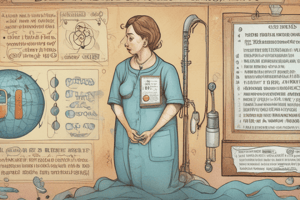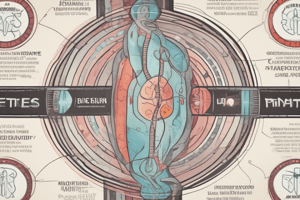Podcast
Questions and Answers
What is one of the primary mechanisms of action of metformin?
What is one of the primary mechanisms of action of metformin?
- Increases insulin secretion from the pancreas
- Lowers blood pressure
- Increases hepatic glucose production
- Decreases intestinal absorption of glucose (correct)
Which of the following is a severe adverse effect associated with metformin?
Which of the following is a severe adverse effect associated with metformin?
- Hypoglycemia
- Severe headache
- Lactic acidosis (correct)
- Increased appetite and weight gain
What is a contraindication for the use of metformin?
What is a contraindication for the use of metformin?
- Severe renal impairment (correct)
- Impaired liver function
- Mild renal impairment
- Hypothyroidism
In older adults, what is an important consideration when prescribing metformin?
In older adults, what is an important consideration when prescribing metformin?
What adjustment should be made to metformin dosage for a patient who is pregnant?
What adjustment should be made to metformin dosage for a patient who is pregnant?
What factor should be considered when timing bolus insulin?
What factor should be considered when timing bolus insulin?
Which method can help estimate carbohydrate consumption more effectively during insulin administration?
Which method can help estimate carbohydrate consumption more effectively during insulin administration?
What is a reason for rotating insulin injection sites?
What is a reason for rotating insulin injection sites?
Which of the following is NOT a lifestyle factor associated with Type II diabetes?
Which of the following is NOT a lifestyle factor associated with Type II diabetes?
What is a potential impact of injecting insulin intramuscularly (IM)?
What is a potential impact of injecting insulin intramuscularly (IM)?
In Type II diabetes, which of the following is associated with impaired insulin sensitivity?
In Type II diabetes, which of the following is associated with impaired insulin sensitivity?
What should be avoided when administering insulin intramuscularly?
What should be avoided when administering insulin intramuscularly?
For effective insulin administration, what should be monitored?
For effective insulin administration, what should be monitored?
What insulin regimen is known to effectively lower HgA1c?
What insulin regimen is known to effectively lower HgA1c?
What is a consequence of not having insulin in the body?
What is a consequence of not having insulin in the body?
What function does basal insulin serve?
What function does basal insulin serve?
What is the primary purpose of bolus insulin in a basal bolus program?
What is the primary purpose of bolus insulin in a basal bolus program?
Which type of insulin is classified as long-acting or basal?
Which type of insulin is classified as long-acting or basal?
What is the typical duration of action for insulin glargine?
What is the typical duration of action for insulin glargine?
In a newly diagnosed type 1 diabetic, what is the typical distribution of basal and bolus insulin needed?
In a newly diagnosed type 1 diabetic, what is the typical distribution of basal and bolus insulin needed?
What is the starting dose of insulin in U/kg for a newly diagnosed diabetic?
What is the starting dose of insulin in U/kg for a newly diagnosed diabetic?
What effect does metformin have on hepatic glucose production?
What effect does metformin have on hepatic glucose production?
What is a potential severe adverse effect of metformin related to gastrointestinal issues?
What is a potential severe adverse effect of metformin related to gastrointestinal issues?
What condition may be exacerbated by the use of metformin in older adults?
What condition may be exacerbated by the use of metformin in older adults?
What medication interaction must be considered when prescribing metformin?
What medication interaction must be considered when prescribing metformin?
What is a key adjustment in metformin dosage for patients who become pregnant?
What is a key adjustment in metformin dosage for patients who become pregnant?
Which of the following is a potential effect of hyperglycemia due to lack of insulin?
Which of the following is a potential effect of hyperglycemia due to lack of insulin?
What is the primary function of basal insulin?
What is the primary function of basal insulin?
What characterizes short-acting insulin compared to long-acting insulin?
What characterizes short-acting insulin compared to long-acting insulin?
What is the typical duration of action for insulin degludec?
What is the typical duration of action for insulin degludec?
In newly diagnosed type 1 diabetics, what is the recommended distribution of insulin between basal and bolus?
In newly diagnosed type 1 diabetics, what is the recommended distribution of insulin between basal and bolus?
Which insulin is classified as a rapid-acting analog?
Which insulin is classified as a rapid-acting analog?
What is one factor that can increase the required dose of insulin?
What is one factor that can increase the required dose of insulin?
What is the starting dose of insulin for a newly diagnosed diabetic patient in U/Kg?
What is the starting dose of insulin for a newly diagnosed diabetic patient in U/Kg?
What is a crucial factor to consider when administering bolus insulin to manage postprandial glucose levels?
What is a crucial factor to consider when administering bolus insulin to manage postprandial glucose levels?
Which of the following factors is NOT typically associated with Type II diabetes?
Which of the following factors is NOT typically associated with Type II diabetes?
What is the most significant reason to avoid intramuscular (IM) injection of insulin?
What is the most significant reason to avoid intramuscular (IM) injection of insulin?
What lifestyle factor is essential for managing Type II diabetes effectively?
What lifestyle factor is essential for managing Type II diabetes effectively?
Which site is most commonly recommended for subcutaneous insulin injection?
Which site is most commonly recommended for subcutaneous insulin injection?
In Type II diabetes, which of the following is a common issue regarding B-cells?
In Type II diabetes, which of the following is a common issue regarding B-cells?
Which carbohydrate consideration should be factored in when administering bolus insulin?
Which carbohydrate consideration should be factored in when administering bolus insulin?
What effect does rotating insulin injection sites have?
What effect does rotating insulin injection sites have?
Flashcards
Factors influencing bolus insulin dosage
Factors influencing bolus insulin dosage
The amount of insulin needed before a meal depends on the type of insulin used, pre-meal blood sugar level, amount of carbs consumed, and anticipated physical activity.
Rotating insulin injection sites
Rotating insulin injection sites
Rotating insulin injection sites helps prevent lipohypertrophy, a build-up of fat at the injection site, which can affect insulin absorption.
IM vs. SQ insulin absorption
IM vs. SQ insulin absorption
Intramuscular (IM) insulin absorption is different from subcutaneous (SQ) absorption, making IM insulin less predictable and generally not recommended.
Factors associated with Type 2 diabetes
Factors associated with Type 2 diabetes
Signup and view all the flashcards
Lifestyle factors in Type 2 diabetes
Lifestyle factors in Type 2 diabetes
Signup and view all the flashcards
Weight management in Type 2 diabetes
Weight management in Type 2 diabetes
Signup and view all the flashcards
Pharmacological approaches in Type 2 diabetes
Pharmacological approaches in Type 2 diabetes
Signup and view all the flashcards
Managing Type 2 diabetes
Managing Type 2 diabetes
Signup and view all the flashcards
Basal-Bolus Insulin Regimen
Basal-Bolus Insulin Regimen
Signup and view all the flashcards
Intensive Insulin Therapy
Intensive Insulin Therapy
Signup and view all the flashcards
What is Basal Insulin?
What is Basal Insulin?
Signup and view all the flashcards
What is Bolus Insulin?
What is Bolus Insulin?
Signup and view all the flashcards
Factors Affecting Insulin Dosage
Factors Affecting Insulin Dosage
Signup and view all the flashcards
Insulin Dosage: Starting vs. Stabilized
Insulin Dosage: Starting vs. Stabilized
Signup and view all the flashcards
Why is Insulin Important for Type 1 Diabetes?
Why is Insulin Important for Type 1 Diabetes?
Signup and view all the flashcards
Basal vs. Bolus Insulin
Basal vs. Bolus Insulin
Signup and view all the flashcards
Metformin's mechanism of action (MOA)
Metformin's mechanism of action (MOA)
Signup and view all the flashcards
Lactic acidosis with Metformin
Lactic acidosis with Metformin
Signup and view all the flashcards
Vitamin B12 deficiency with Metformin
Vitamin B12 deficiency with Metformin
Signup and view all the flashcards
Metformin contraindication: Severe renal impairment
Metformin contraindication: Severe renal impairment
Signup and view all the flashcards
Hypothyroidism in the Elderly
Hypothyroidism in the Elderly
Signup and view all the flashcards
Metformin MOA
Metformin MOA
Signup and view all the flashcards
Metformin Contraindication: Renal Impairment
Metformin Contraindication: Renal Impairment
Signup and view all the flashcards
Metformin and Vitamin B12
Metformin and Vitamin B12
Signup and view all the flashcards
Metformin and Lactic Acidosis
Metformin and Lactic Acidosis
Signup and view all the flashcards
Elderly Hypothyroidism
Elderly Hypothyroidism
Signup and view all the flashcards
What is a Basal-Bolus Insulin regimen?
What is a Basal-Bolus Insulin regimen?
Signup and view all the flashcards
What factors affect bolus insulin dosage?
What factors affect bolus insulin dosage?
Signup and view all the flashcards
Which insulin regimens can lower HbA1c?
Which insulin regimens can lower HbA1c?
Signup and view all the flashcards
Why is it important to rotate insulin injection sites?
Why is it important to rotate insulin injection sites?
Signup and view all the flashcards
What are the consequences of not having enough insulin?
What are the consequences of not having enough insulin?
Signup and view all the flashcards
Why avoid intramuscular insulin injections?
Why avoid intramuscular insulin injections?
Signup and view all the flashcards
What are the key factors associated with Type 2 diabetes?
What are the key factors associated with Type 2 diabetes?
Signup and view all the flashcards
Which insulins are considered 'basal' (long-acting)?
Which insulins are considered 'basal' (long-acting)?
Signup and view all the flashcards
Which insulins are considered 'bolus' (short-acting)?
Which insulins are considered 'bolus' (short-acting)?
Signup and view all the flashcards
What lifestyle factors contribute to Type 2 diabetes?
What lifestyle factors contribute to Type 2 diabetes?
Signup and view all the flashcards
What are the goals of pharmacological approaches to managing Type 2 diabetes?
What are the goals of pharmacological approaches to managing Type 2 diabetes?
Signup and view all the flashcards
What is the onset of Lispro insulin?
What is the onset of Lispro insulin?
Signup and view all the flashcards
What is the duration of action of Insulin glargine?
What is the duration of action of Insulin glargine?
Signup and view all the flashcards
Why is weight management so important in managing type 2 diabetes?
Why is weight management so important in managing type 2 diabetes?
Signup and view all the flashcards
What is the typical insulin dosage for a new diabetic vs. stable diabetic?
What is the typical insulin dosage for a new diabetic vs. stable diabetic?
Signup and view all the flashcards
What are the key elements of diabetes self-management?
What are the key elements of diabetes self-management?
Signup and view all the flashcards
Study Notes
Insulin Regimens and Adverse Effects
- Insulin regimens, such as basal-bolus and intensive insulin, can improve long-term outcomes by reducing HbA1c levels. Intensive regimens involve multiple daily injections or continuous subcutaneous administration via an insulin pump.
- Lack of insulin can lead to hyperglycemia, ketoacidosis (acidity in the blood, fruity breath), weight loss, and elevated lipids and triglycerides. Tissue breakdown and high triglycerides are also potential outcomes.
Basal Insulin Purpose
- Basal insulin, when used in appropriate doses, suppresses the liver's glucose production, maintaining near-normal blood sugar levels during fasting.
Bolus Insulin Purpose
- Bolus insulin (usually prandial or pre-meal) addresses the additional glucose requirements after meals, decreasing post-meal blood sugar fluctuations.
Long-Acting Insulins
- Long-acting insulin analogs include glargine (1000 and 300 units/mL), detemir, and degludec (100 and 200 units/mL), known for their extended durations of action and consistent blood sugar levels.
Short-Acting Insulins
- Short-acting insulin analogs, such as lispro, aspart, and glulisine, have quicker onset and peak action times, shorter durations, and generally lower weight gain and less risk of hypoglycemia.
Insulin Onset and Duration
- Lispro insulin onset is 15 to 30 minutes.
- Insulin glargine duration is 20 to more than 24 hours
Type 1 Diabetic Insulin Dosing
- The general percentage of basal to bolus insulin needed in a newly diagnosed type 1 diabetic is 50% each.
Insulin Dosing Factors
- Factors influencing insulin dosing include carbohydrate intake, pregnancy, puberty, illnesses, and medical conditions.
Insulin Dosing Adjustments
- Daily insulin doses may need adjustment when a patient is sick or has certain medical conditions.
Insulin Injection Sites
- Insulin injections are typically subcutaneous, with rotation of injection sites to prevent lipohypertrophy. Avoiding intramuscular injections is recommended.
Type 2 Diabetes Risk Factors
- Insulin resistance, impaired insulin secretion, elevated hepatic glucose production, insufficient beta cell function, and obesity (especially in type 2 diabetes) are common risk factors (frequently termed insulin resistance).
Metformin Mechanism of Action
- Metformin decreases hepatic glucose production, reduces intestinal glucose absorption, and improves insulin sensitivity.
Metformin Side effects
- Gastrointestinal side effects (nausea, vomiting, flatulence), lactic acidosis (risk increased when renal impairment is present), vitamin B12 deficiency are noted ADEs for metformin.
SGLT2 Inhibitors Mechanism of Action
- SGLT2 inhibitors block the reabsorption of glucose in the kidneys, leading to increased glucose excretion in urine.
Potential ADE of SGLT2 Inhibitors
- Acute kidney injury (risk related to increased osmotic diuresis), volume contraction, hypotension, and an elevated risk of genitourinary infections (such as UTIs) are among potential adverse effects associated with SGLT2 inhibitors.
GLP-1 Receptor Agonists
- These medications enhance glucose-dependent insulin secretion, slow gastric emptying, and reduce postprandial glucagon.
Topical Corticosteroids Potency
- Based on potency (lowest to highest): hydrocortisone, triamcinolone, clobetasol.
Indications for High-Dose Topical Steroids
- Acute flare-ups of skin conditions and prevention.
Hypothyroidism Treatment Medications
- Levothyroxine (synthetic T4)
- Liothyronine (synthetic T3)
- Desiccated thyroid (natural thyroid)
Hypothyroidism/Hyperthyroidism Lab Values
- TSH (mU/L): 0.4-4.5
- Free T4 (ng/dL): 0.9-2.3
- Total T4 (µg/dL): 5.0-11.0
- Free T3 (pg/mL): 2.3-4.2
Studying That Suits You
Use AI to generate personalized quizzes and flashcards to suit your learning preferences.




